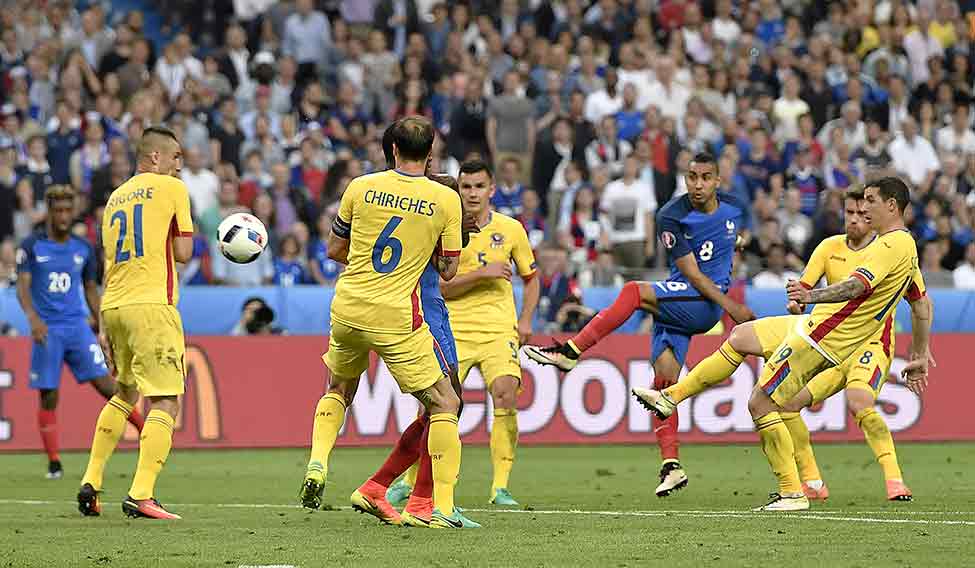With apologies to those who remain convinced that to be the world’s greatest sportsman a person has to be born with a cricket bat in hand, the growing global attraction with football gets harder to ignore by the year.
Football unites, football divides. Even in India, viewers can decide whether to watch televised games from the European Championship in France or the Copa América Centenario currently being played in the US.
Actually, the Euro is for real, though its start has been marred by horrific crowd violence and by the pervading terrorist threat. And the tournament in America is false. The Copa is South America’s cup, but this was not the year for a scheduled Copa América (which was won by Chile barely one year ago). However, the marketing men spotted an opportunity to make big bucks by staging an extra “Copa” to celebrate 100 years of the event—and to play it not in South America but in the US where the big brand companies will pay the most for it. So far, the one truly pulsating game has been Argentina versus Chile in front of 69,451 fans in Santa Clara, California. But even there, some fans complained that they paid to see Lionel Messi, and Messi because of back injury didn’t play.
That is sport. The injured cannot perform. Messi came back, to score three times in 30 minutes against Panama which—like Costa Rica, Haiti, Jamaica, Mexico and the US from north and central America—has been invited as guests to beef up the numbers in the South American cup.
Meanwhile, Brazil, the most decorated soccer nation on earth, is out of the Centenario before the second round began. Brazil was eliminated by a ball knocked into the net by the hand of Peru’s Raúl Ruidíaz—a handball so blatant that almost everybody in the stadium knew it, except the referee and his assistants.
Brazil can, and will, claim that a cheat’s goal knocked them out. But Brazil coached by Carlos Dunga is a betrayal of The Beautiful Game. Under Dunga, creativity is replaced by energy and industry, which is like putting artists into a straitjacket.
So the centennial tournament not only is out of schedule, but has now lost a champion who goes away crying foul.
Europe, surely, must do better? It was in France that FIFA was founded. So too were the World Cup and the European football championship. Many of us were looking to the French to carry on, if they could, the proud tradition of Michel Platini leading them to win the 1984 Euro on home soil, and then Zinedine Zidane inspiring Les Bleus to win the World Cup in Paris in 1998.
It might still happen. Dimitri Payet, with the most beautiful of goals and with cute passes and movements in midfield, set the 2016 tournament alight in the Stade de France last weekend.
English hooliganism which had been held at bay since the 1990s through deeply committed policing, resurfaced in Marseille before the game against Russia. For three nights, English men and youths, often inebriated, fought street battles with police who responded with tear gas and water cannon.Then a more sinister element arrived, the Russians. So-called soccer hooliganism manifests itself in a deeper form in eastern Europe where it is tied up with racial hatred and homophobia. Before and after England played Russia on Sunday (a 1-1 draw in Marseille) the violence was horrifying.
We saw, even before a Marseille prosecutor pointed it out, that England’s trouble makers were stupid with alcohol but some Russians were a different breed. They wore black clothing and sometimes black masks. They were physically powerful men, some stripped to the waist in the manner of President Putin’s he-man photographs of recent years.
French authorities said that 150 of these individuals attacked without discrimination. They didn’t care if the victims were men, women or children. They kicked one 50-year-old British man into a coma, and he was gravely ill in hospital after a police officer gave him CPR on the floor where he lay in Marseille’s old port.
The Russians, the English, and in other cities Germans, Ukrainians, Northern Irish and Poles all appeared to be there for the fight as much as for the football. And given that France is under emergency lockdown, trying to sustain a 51-game tournament in the face of pronounced terrorist threat, even the mildest of aggressions seems irresponsible. Nobody knows what violence might trigger, literally, in this situation. And the games play on. France narrowly, nervously came through the opening game thanks to Payet, a player from Reunion Island in the Indian Ocean who was not even rated in France until he had an extraordinary season in England with West Ham United.
Now, the French call Payet their magician.And when we talk about football creators, who does it better, in tournament after tournament, than Barcelona’s quiet man, Andrés Iniesta? He has been called Saint Andrés after his winning goal for Spain at the 2010 World Cup final, and at the start of this week he turned goal-provider with an angled pass into the goalmouth for Gerard Pique to head the winner against the Czech Republic. With Spain winning, Germany winning, and France winning, the three nations at the top of the bookmakers’ odds all made their mark on the opening round of games.So, too, did Italy. This was written off, in Italy, as the worst Azzurri team the country has sent to a major event in 50 years. But anyone who follows the Italians knows that they are mean and dangerous when people doubt them.
By the end on July 10, we are talking about sport and its values, rather than the fears that are self-inflicted by people who call themselves fans. And above even that, by a communal spirit among 2.5 million fans that transcends the fear of fanatical intervention.






